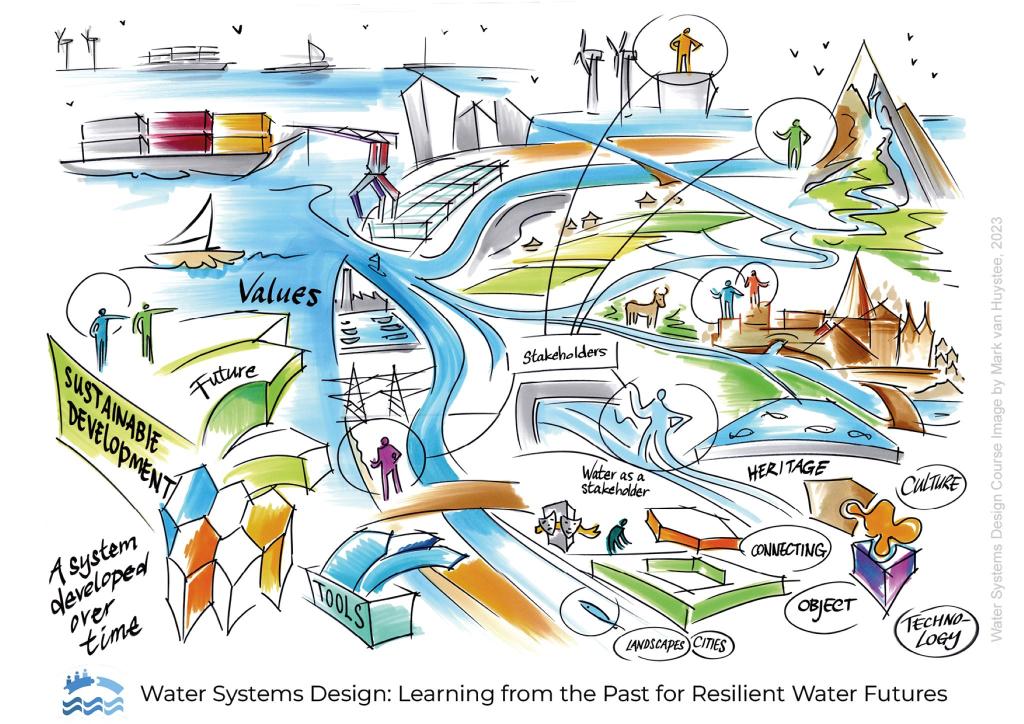10th World Water Forum Official Thematic Session
Venue: Bali Nusa Dua Convention Center (Room: Kintamani 2)
Date: Thursday 23rd May 2024
Register for the Afternoon Program 13:00-14:30 (WITA)
Meet the Speakers!
Session T6B3 builds upon the examples of organizational innovation presented in T6B1 and T6B2 to concretize good practices and methodologies that create new pathways for water-smart futures.
In the run up to the conference, speakers will prepare and disseminate short videos to inform attendees of the World Water Forum on their experience and the questions they will address at their respective roundtables.
The session will be divided into three parts, allowing time and space for the audience to engage among themselves and with speakers through online tools and roundtable discussions.
In the first part of the session, speakers will pitch key takeaways of practices from around the world on how science-policy-action interlinkages can drive progress towards SDG6, with a focus on: complementing scientific research with indigenous knowledge to enhance policy decisions; combining local values and socio-economic aspects with hydrological modeling to create best management water solutions through Living Labs; gathering new ideas for river basin organizations (RBOs) through Hackathons; achieving security, sustainability and resilience of water ecosystems through Water-Oriented Living Labs (WOLLs); capacity building and mentoring youth for water and peace; connecting science and the private sector for innovative water resource management; converting science into actionable policies for water treatment; and gamification as a tool to raise water awareness and sensitivity among different actors.
In the second part, the audience will engage with speakers through six roundtables (5-10 participants). Together, they will dive deeper into the methodological approaches and explore the relevance of these models for participants from different backgrounds. The audience can choose a roundtable and propose topics to address. The roundtables will focus on: connecting local communities with government, potential funders, academia and international initiatives; building Living Labs and engaging stakeholders at different governance levels; the limits and promises of Hackathons to promote policy formulation and expand collaboration; engaging the youth through multidisciplinary and hybrid approaches; and the Water Oriented Living Labs (WOLLs) experience in creating community-centered solutions.
The session will conclude with the development of recommendations for policy and decision makers based on the insights gained. All participants will collectively develop pathways to create change in diverse spatial, social, and cultural contexts and bring together science, policy, and action.
The proposed outcomes of the sessions are position and academic papers published through multidisciplinary platforms such as the open access journal Blue Papers; the creation and growth of international community of practices, the promotion of future engagements (i.e. online exhibitions on the Living Waters Museum website); and the co-creation of a white paper with policy recommendations.
This session is open to everyone. It invites diverse stakeholders, researchers, scientists, activists, artists, serious game experts, water managers, heritage experts, traditional/community leaders and knowledge holders, local organizations (eg. RBOs, etc.), NGOs, funders/donors, and policymakers with interests in engaging actors across different sectors to co-create context-sensitive water solutions able to target multi-scalar issues for water-smart futures.
Proposed program
13:00 - 13:02 Introduction and welcome message
Carola Hein, TU Delft, UNESCO Chair Water, Port and Historic Cities
13:02 - 13:05 Elevator pitch
Activating Long-term thinking: Water Values professional education course and game
Carola Hein/Matteo D’Agostino/Carlien Donkor, TU Delft, UNESCO Chair Water, Ports and Historic Cities
13:05 - 13:08 Elevator pitch
Dissemination Platform, Blue Papers
Carola Hein/Matteo D’Agostino/Carlien Donkor, TU Delft, UNESCO Chair Water, Ports and Historic Cities
13:08 - 13:12 Elevator pitch
Converting science into actionable policies for sustainable wastewater management
Alex Pires – UNEP
13:12 - 13:15 Elevator pitch
Integrating Indigenous Knowledge and Science within Existing Governance and Financing Frameworks
Mtembu Odwa Ntsika - World Water Quality Alliance, member of World, African and South Africa Youth Parliament for Water
13:15 - 13:18 Elevator pitch
Multidisciplinary and Digital Tools for Youth Engagement and Capacity Building
Sara Ahmed - Founder, Living Waters Museum
13:18 - 13:21 Elevator pitch
Connecting Science and private sector for Innovative Water Resource Management
Lucija Plantak Steering Committee member, UNESCO Groundwater Youth Network / Michel Frem President UNESCO Groundwater Youth Network, PhD Candidate, IHE-Delft
13:21 - 13:24 Elevator pitch
Water-Oriented Living Labs: Valuing Water to Ensure Security, Sustainability and Resilience
Andrea Rubini, Director of Operations, Water Europe
13:24 - 13:27 Elevator pitch
Hackathon Method: Translating Fresh Ideas of RBOs into Policy Action
Lia Dahlia, Rifaldi Aji, Raihan Firdaus - Bandung Institute of Technology
13:27 - 13:30 Elevator pitch
South-South and Triangular Cooperation for Water and Heritage
Sergio Ribeiro, director CIRAT, ICOMOS ISC-Water
13:30 - 13:35 Breakup into 5-7 Roundtables, Audience Choice
13:35 - 14:05 Parallel Roundtables
-RT 1 Activating Indigenous Knowledge and Science for Policymaking (Mtembu Odwa Ntsika)
-RT 2 Using Hackathons to Promote Policy Formulation and Expand Collaboration (Lia Dahlia, Rifaldi Aji, Raihan Firdaus)
-RT 3 Focusing on People: Water-Oriented Living Labs for Community-centered Solutions (Andrea Rubini)
-RT 4 Engaging the Youth through Multidisciplinarity and Hybrid Approaches (Sara Ahmed)
-RT 5 Bringing scientific knowledge to policy makers and action takers at global level (Alex Pires)
- RT6 Inclusive Water Resource Management for Governance improvement (Lucija Plantak and Michel Frem)
14:05 - 14:25 Takeaways from the parallel sessions
One rapporteur for each roundtable.
Commentators:
- Tanya Huizer (ADB)
- Eriberto Eulisse (Wamunet)
- Luzette Kroon (Wetterskip Fryslân)
- Erik de Maaker (Leiden University)
- Julia Sumarthinningrum Dahlan (TU Delft)
- Eddy Moors (IHE-Delft)
14:25 - 14:30 Conclusion and Future Steps
Carola Hein/Matteo D’Agostino/Carlien Donkor, TU Delft, UNESCO Chair Water, Ports and Historic Cities

